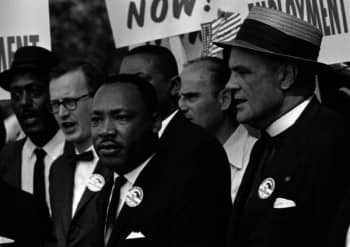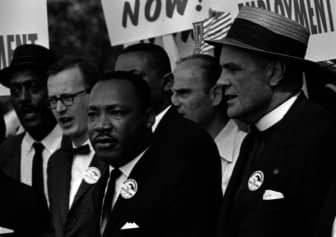

Fifty years ago today, Civil Rights Leader Martin Luther King Jr. was assassinated in Memphis outside the Lorraine Motel room where he and his friends and advisors were working on their crusade against poverty.
King welcomed people of all creeds and races, even poor whites, to the fight against poverty, which he saw as one of three great evils gripping America alongside racism and war. Those who struggle against the injustice of a system that seems stacked against them lost a potent champion when the assassin’s bullet struck King down.
King had already enjoyed significant progress in opposing racism and promoting Civil Rights though his non-violent approach to civil disobedience and protest against unequal treatment of black Americans. But by his reckoning, the evils of racism, poverty and war were intertwined, and he was determined to oppose them all.
“We aren’t going to get rid of one without getting rid of the other,” King is quoted during the HBO documentary, “King in the Wilderness,” about the final chapters of the renowned Civil Rights leader’s life and work.
On the anniversary of the loss of a man poised to lead a movement that promised to deliver all Americans from the indignity and misery of poverty, America is more financially unbalanced than ever.
In testimony to The Brookings Institution, nonresident senior fellow Melissa S. Kearney reports that between 1947 and 1975, families in the bottom 20 percent saw their income grow by 90 percent. Income growth was 86 percent for families in the top five percent.
Between 1975 and 2010, families in the bottom 20 percent saw their income increase by 3.7 percent while those in the top five percent saw an average income gain of 57 percent.
Perhaps that trend might have been curbed had King lived to see his “Poor People’s Campaign,” and create a tent city on the National Mall, that would, as described in The Nation in 2010, “dramatize the reality of joblessness and deprivation by bringing those excluded from the economy to the doorstep of the nation’s leaders.”
Instead, if anything, that trend has continued to accelerate in the new century, unchecked by either Democratic or Republican leadership. The nation’s ability to come to grips with this issue, as well as others, has been crippled by a simultaneous consolidation of broadcast and print media properties Americans have long depended on to take stock of, debate and inform the solutions to the nation’s ills.
As greater wealth has concentrated at the top, so has the ownership of newspapers, radio and television broadcasters.
The Providence Journal has continued to lose veteran reporters following its acquisition by Gatehouse Media, which hardly paused after in its continual purchase of news properties.
New Media Investment Group Inc., the New York-based holding company that controls GateHouse, has spent hundreds of millions acquiring newspapers since 2014. It is owned by Fortress Investment Group, in turn owned by Japanese multinational firm SoftBank Group, according to a bizjournals.com report.
Sinclair Broadcasting, which owns more than 190 TV stations, added WJAR 10 to its collection in 2014. Channel 10 anchors were among several nationwide directed to recite a speech warning against “biased and false news,” illustrated by a recent video produced by Deadspin. The speech, cloaked in the form of a public service announcement, has been criticized as a mass-produced piece of propaganda. The language closely follows the theme of President Donald Trump’s recent attacks on mainstream media.
A report from Reuters notes Sinclair is seeking to extend its reach, and its recently demonstrated power to compel local news reporters to speak in its voice, with the purchase of Tribune Media Co.’s 42 TV stations in 33 markets, stretching to 72 percent of American homes.
Opposition to the expansion from the Oval Office is unlikely.
“So funny to watch Fake News Networks, among the most dishonest groups of people I have ever dealt with, criticize Sinclair Broadcasting for being biased. Sinclair is far superior to CNN and even more Fake NBC, which is a total joke,” Trump wrote on Twitter.
The equality King strove for five decades ago seems further from our grasp than ever, but it’s not beyond our reach. The FCC must be pressured to halt the consolidation of broadcast media. Longer term, the 2018 midterm elections present the best hope to begin to turn the tides pushing against a fair shot at prosperity and an equal voice for all Americans.
The work of undoing the past 50 years of neglect can begin by keeping King in mind throughout our lives as citizens, and not just during the anniversaries of his accomplishments and loss. But if a date for remembering him is really necessary, election day in 2018 would be a much more fitting one.
This is a test
